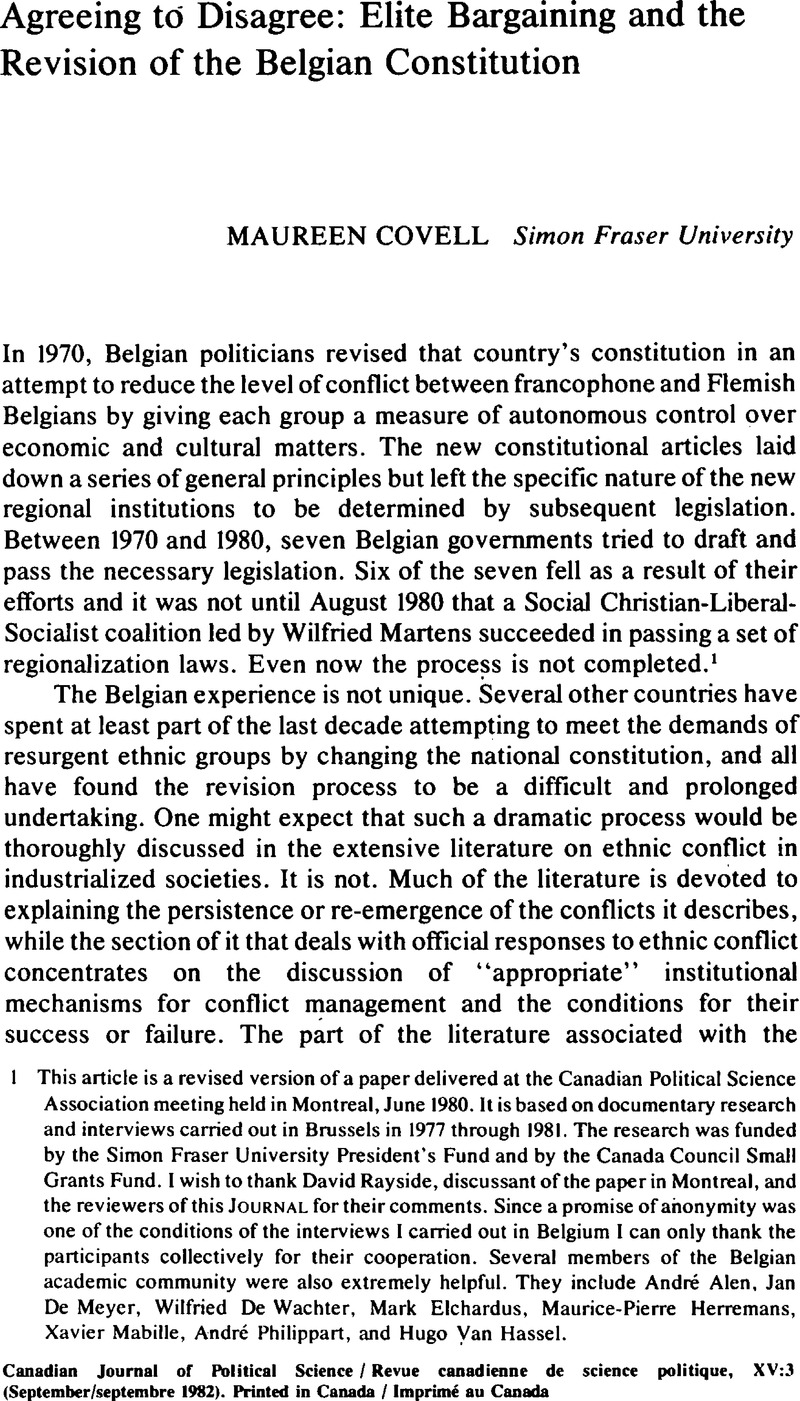Published online by Cambridge University Press: 10 November 2009

1 This article is a revised version of a paper delivered at the Canadian Political Science Association meeting held in Montreal, June 1980. It is based on documentary research and interviews carried out in Brussels in 1977 through 1981. The research was funded by the Simon Fraser University President's Fund and by the Canada Council Small Grants Fund. I wish to thank David Rayside, discussant of the paper in Montreal, and the reviewers of this JOURNAL for their comments. Since a promise of anonymity was one of the conditions of the interviews I carried out in Belgium I can only thank the participants collectively for their cooperation. Several members of the Belgian academic community were also extremely helpful. They include Alen, André, Meyer, Jan DeDe Wachter, WilfriedElchardus, MarkHerremans, Maurice-PierreMabille, XavierPhilippart, André and Hassel, Hugo Van.Google Scholar
2 The bargaining framework used in this paper is based on that developed by Snyder, Glenn H. and Diesing, PaulConflict among Nations: Bargaining, Decision-Making and System Structure in International Crises (Princeton: Princeton University Press, 1977).Google Scholar Although, as the title indicates, Snyder and Diesing are interested in bargaining at the international level, they also provide a thorough discussion and synthesis of general theories of bargaining.
3 See Rowies, LucLes Partis politiques en Belgique (Brussels: Centre de recherche et ďinformation socio-politiques [CRISP] Dossier No. 10. 1977).Google Scholar Electoral statistics are taken from Mabille, Xavier, “Les résultats de I'élection de Novembre, 1981,” CRISP. Courrier Hebdomadaire Nos. 943, 944 (1981).Google Scholar
4 De Wachter, Wilfried “La hiérarchie du pouvoir dans la politique belge,” Res Publica 15 (1973), 279–90.Google Scholar
5 Obler, Jeffrey “Intraparty Democracy and the Selection of Parliamentary Candidates: The Belgian Case,” British Journal of Political Science 4 (1974). 163–85.CrossRefGoogle Scholar
6 Wigny, PierreLa troisième révision de la constitution belge (Brussels: Emile Bruyland, 1972).Google Scholar
7 For a more detailed account, see “Du dialogue communautaire de I'hiver 1976–7 au Pacte communautaire de mai 1977,” CRISP, Courrier Hebdomadaire No. 767 (1977).
8 Snyder, and Diesing, , Conflict among Nations, 83.Google Scholar
9 Conflict among Nations, 43–44.Google Scholar
10 Conflict among Nations, 53–54.Google Scholar The authors call this game “Bully,” a term that several French-speaking newspapers and negotiators would accept with enthusiasm but which the CVP bargainers would reject with much indignation. 1 have preferred to use a more neutral term: all sides agree that the CVP dominated this phase of the bargaining.
11 Mabille, X. and Brassine, J., “Les élections législatives du 17 décembre 1978 (II),” CRISP, Courrier Hebdomadaire No. 828 (1979), 9.Google Scholar
12 Brassine, Jacques, “Les 99 jours de crise communautaire,” CRISP, Courrier Hebdomadaire Nos. 847–48, 849–50.Google Scholar
13 Volk, Hel, April 3, 1980. Quoted in Lettre de Belgique No. 13, 1980.Google Scholar
14 Snyder, and Diesing, , Conflict among Nations, 44–45.Google Scholar
15 Spécial, October 25, 1979.Google Scholar